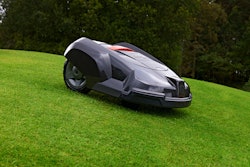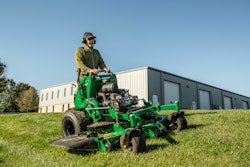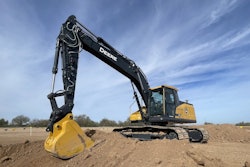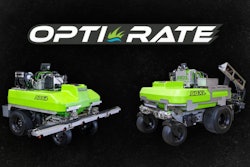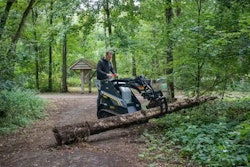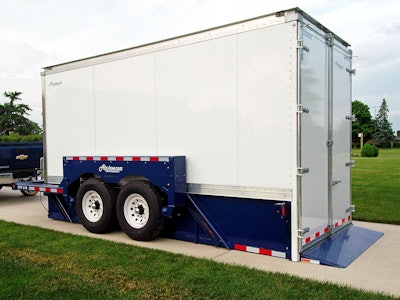 Photo: Air-tow
Photo: Air-towA trailer is a trailer, right? Surely there can’t be much that goes into shopping for the piece of equipment needed to tow your machines to each landscaping job.
It’s easy to believe this, but just like how there are numerous numbers of specs to consider when selecting the best mower or compact piece of equipment for your landscape operations, trailers are no different.
“There is no one size fits all when it comes to trailers,” says Troy Geisler, vice president of sales and marketing with Talbert Manufacturing. “Each contractor faces unique challenges and has individual requirements. Working with an experienced dealer and manufacturer is the best way to ensure the right trailer is selected.”
Below are some of the factors to keep in mind when shopping for your next trailer.
Specs to consider
The main goal of a trailer is to safely and efficiently transport your landscaping equipment from site to site, but there are a number of questions you need to ask in order to find the right one for your business.
“Moving loads from one site to another comes with a great deal of responsibility,” Geisler says. “As does loading and offloading equipment. To ensure safe operation, it’s best to start with a trailer from a high-quality manufacturer that emphasizes safety and durability from engineering through production.”
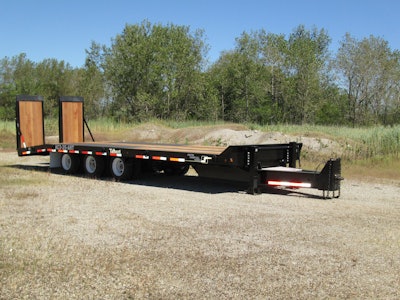 Photo: Talbert Manufacturing
Photo: Talbert ManufacturingSome of the questions you need to ask include “How big is the equipment or cargo?” and “How heavy is the load going to be?” Knowing the weight and dimensions of the equipment being hauled can put you on the right track.
“To determine the best fit for their equipment, landscapers should look at deck length, deck height, GVWR and empty weight,” Geisler says. “These specs, combined with knowledge of the weight and dimensions of their equipment, should help them select a suitable trailer for their needs.”
For example, if you need to move small dozers or excavators, Talbert Manufacturing’s Tag-A-Long series of trailers have capacities from 10 to 30 tons.
Figuring out what size trailer works best for you depends on a number of factors, especially if you are still in the early stages of your landscaping business.
“For landscapers, it is best to evaluate what the trailer will be used for during the next two to three years,” says Al Behr, founder of Air-tow Trailers. “Many times, a landscaper will start out with a trailer that is too small. Sometimes, this is because of the price and sometimes they just don’t know what they would do with the extra bed space at the time. This often leaves them wishing they had invested in a larger model to begin with.”
Geisler agrees that trailer purchases should be viewed as a long-term investment and adds that landscape contractors should look at the trailer’s effect on productivity, construction and design, maintenance needs and resale value. Depending on a landscaper’s skill set, location, secured and possible business contracts, startup capital and willingness of risk vs. reward will determine whether they should go big or opt for the smaller trailer.
Geisler says the size of the trailer will ultimately affect fuel economy, but Behr says it is not enough to notice a difference between a smaller or larger trailer.
 Photo: Talbert Manufacturing
Photo: Talbert Manufacturing“However, when weighing the pros and cons of a larger trailer, operators should make sure they have adequate capacity, regardless of fuel economy,” Geisler says. “Overloading a trailer is dangerous. Even if it means losing fuel economy, a trailer should have the capacity for the designated load.”
Whether the trailer is enclosed with also affect the fuel economy.
“Enclosed trailers have more wind resistance than a flatbed or utility trailer, which can affect fuel economy, especially driving at high speeds,” Behr says. “Air-tow enclosed trailers are available with nose cones to reduce wind resistance and boost fuel efficiency.”
Yet despite this, and enclosed trailers being more expensive, they tend to be a popular choice thanks to the level of security they can provide.
“Lawn mowers, chain saws, stone cutter tools, shovels, rakes and such can be secured in an environment out of the elements,” Geisler says. “This solution can even be used for off season storage. However, an enclosed trailer is not safe for the storage of larger, fully-fueled diesel and gasoline machines.”
“An Air-tow enclosed trailer can be lowered to the ground and left at a job site uncoupled from a tow-vehicle without the risk of trailer or equipment theft,” Behr says. “As an added bonus, the sides of an enclosed trailer provide a mobile billboard to promote your business.”
Ease of loading is another consideration.
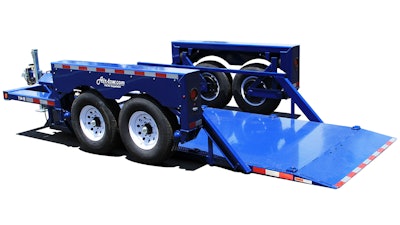 Photo: Air-tow
Photo: Air-tow“For most landscapers, the convenience of loading and unloading is very important,” Behr says. “They want to be able to access the equipment quickly and safely, with as little effort as possible. Trailers that tilt or use ramps should not be considered, because they add time and unnecessary risk to the loading and unloading process.”
Air-tow’s trailers eliminate the need for ramps thanks to its trailer deck that can be lowered by hydraulics in less than 30 seconds.
“A drop-deck trailer, such as Air-tow, is preferred by many landscapers,” Behr says. “The deck lowers completely to the ground and remains level throughout the process. It is easy load and unload mowing equipment, plants, fertilizer, etc.”
As for ensuring safety on the road, a trailer with a low center of gravity can help with load integrity and maneuvering around tight corners.
What the trailer is made out of will vary from materials such as steel, aluminum or composites. Some material choices may keep the price down, but it can cost durability.
“A trailer with a wood deck may be cheaper, but they do wear out a lot faster than steel and may have to be replaced several times throughout the trailer’s lifetime,” Behr says.
Geisler advises that landscapers who are overwhelmed by the number of options to choose from should work with a trusted dealer to find the best trailer for their operations.

